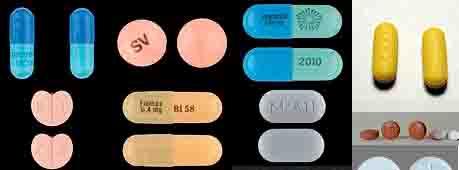Table of Contents
Over the Counter and Prescription Medications
Many over the counter, prescription, human and veterinary medicines are poisonous to dogs. This leading cause of canine poisoning is particularly problematic for veterinary medications since they are flavored to make them more palatable to dogs. Giving your dog human medications in human dosages also results in dog poisoning.

Details on specific medications:
- Over The Counter Medications:
- Prescription Medications
Dog Toxic Over The Counter Pain Medications
Ibuprofen (Advil, Motrin) and Naproxen (Aleve) are toxic at very low doses. Dogs are not able to eliminate and detoxify these medications. These drugs can cause kidney damage, liver damage and stomach ulcers.
Acetaminophen (Tylenol) is toxic at larger doses (as little as 2 pills in a medium sized dog can cause organ damage) and doesn't work particularly well in dogs. This drug can cause kidney and liver damage, plus damage to red blood cells. Related symptoms are salivation, weakness, abdominal pain and vomiting.
Buffered aspirin (Bufferin, Entorin) is prescribed for dogs who have arthritis. Do not give this medicine to dogs that are taking other anti-inflammatory drugs such as Rimadyl, EtoGesic, Deramaxx). Aspirin use can cause stomach ulcers in dogs.
Prescription Medications
Anti-depressants
(Lexapro, Prozac, Effexor, Cymbalta): leads to neurological disorders such as seizure, body tremors, coordination problems and being sedated. They can also act to elevate blood pressure and the heart, causing dangerous elevated levels.
Attention Deficit Disorder (ADD) Medications
These types of medications contain amphetamines and methylphenidate. These ingredients act as stimulants which can cause a life-threatening condition. Symptoms of dog ADD medication ingestion include heart problems, higher body temperature, seizures and body tremors.
Anxiety and Sleeping Pills
Medications such as Lunesta, Ambien, Klonopin and Xanax reduce levels of anxiety and induce sleep. In dogs they can act as a stimulant causing agitation. Other symptoms are slower breathing, lack of coordination, and lethargic behavior.
Beta Blockers (heart medications)
Any beta-blocker (Coreg, Toprol, Tenormin) will cause heart abnormalities and act as a dog poison. Larger doses can be life threatening such it reduces the heart rate and blood pressure.
Birth Control Pills
The medications progesterone, estrogen and estradiol come in packaging which is attractive to dogs. In small doses these medications should not cause dog poisoning issues. If taken in larger doses, medications that contain estradiol and estrogen can result in issues such as estrogen poisoning, particularly in female dogs that have not been spayed.
Cholesterol Control Medications
Medications such as Crestor, Zocor and Lipitor (statins) usually only result in mild symptoms such as diarrhea or omitting.
Thyroid Medications and Dog Poisoning
The thyroid medications that act hormone replacements such as Synthroid, and Armour desiccated thyroid do not usually cause issues since human doses for these types of medications are below levels prescribed to dogs. That said, overly large doses can be problematic. Symptoms of dog poisoning include:
- aggressive behavior
- rapid heart rate
- panting
- nervous behavior
- body tremors
Other harmful medications:
- Psuedophedrine (Sudafed)
- Flourouracil (Efudex)
- Calcipotriene (Dovonex)
- Prescription Skin Creams
- Isoniazid (tuberculosis medication)
In Case of Emergency:
If your dog has taken any of the medications poisonous to dogs call your emergency veterinarian immediately and induce vomiting. Let the veterinarian know the name of the drug and the dosage (the number of milligrams if you have it). For dosages of aspirin and acetaminophen if you see symptoms such as lethargic behavior, vomiting, diarrhea or appetitive loss call your vet.
For immediate advice call one of these dog poison control hotlines:
- ASPCA: (888) 426-4435 ($65 fee)
- Pet Poison Hotline: (800) 213-6680 ($35 fee)
Treatments for any of these drugs can include charcoal to absorb any remaining medication, drugs to protect against stomach ulcers, fluids to flush the drug from the blood and if severe, blood transfusions.
